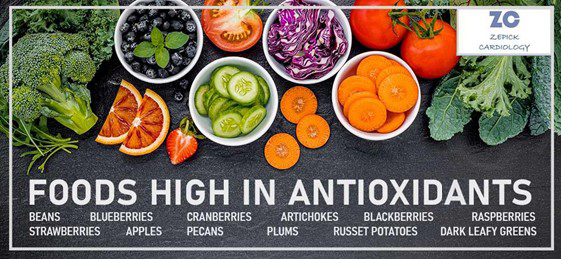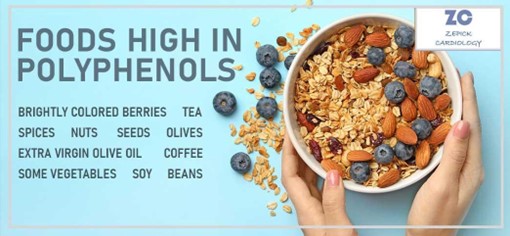Smart Food: Micronutrients That Help Your Heart
The Best Vitamins, Minerals & More for Cardiovascular Health
We have known for a long time that your diet plays a big role in your health. What you eat impacts your risks for such conditions as diabetes, stroke, and cardiovascular disease. But what is inside food that causes this? This article delves into the science behind micronutrients – how the tiny components inside your food impact your heart health.
The cardiologists at Zepick Cardiology in Wichita work with patients at high risk for heart problems to make sure they know what foods are most effective at reducing their risk factors. Changing to a Pesco-Mediterranean diet is one lifestyle change to greatly benefit your heart.
What makes the Mediterranean diet or other diets focused on plants and fish so beneficial for your heart is their focus on foods that do not have a lot of saturated fat or sodium. But in addition to that, these diets encourage you to eat foods that are rich in micronutrients, including unsaturated fatty acids, antioxidant vitamins, and minerals.
Each food contains many different micronutrients. And some are better than others. After nearly 900 studies, involving more than 800,000 people, we now have valuable information including:
- Which micronutrients provide the most cardiovascular benefits
- Which risk factors are improved by micronutrients
- Which diseases are most impacted by additional micronutrients

What are Micronutrients?
Micronutrients are naturally occurring components in the food we eat. Many also exist artificially in food, drink and/or supplements. You only need to look down the vitamins aisle at the pharmacy or grocery store to see a dizzying amount of options. Each supplement can be beneficial in its own way. We will focus on several micronutrients that have been recently studied for their impact on cardiovascular health factors.

Twenty-seven micronutrients were studied, each of which fits into one of these categories:
- Fatty acids
- Amino acids
- Vitamins
- Minerals
- Antioxidants
- Polyphenols
The Power of Polyphenols
Among the studies on which micronutrients can benefit your health, polyphenols showed great results for a variety of health issues. Polyphenols are something you are likely getting on a regular basis, but probably don’t know much about.
Polyphenols are not one thing. They refer to a group of micronutrients naturally found in plants. About 8,000 polyphenols have been identified so far. Polyphenols are good for anyone’s diet, but they can especially make a positive impact on those suffering from illness or disease.
- Type 2 Diabetics saw better blood glucose numbers and improvement in cholesterol levels, blood pressure, and hemoglobin A1c.
- Those with hypertension benefitted from reduced blood pressure numbers
- Overweight or obese people had reduced systolic blood pressure, higher good (LDL) cholesterol levels, and lower blood glucose numbers.
- Postmenopausal women taking additional polyphenols saw better blood pressure numbers. For information on how vitamins & hormone therapy affect cardiovascular health for postmenopausal women, click here to learn about what research has found.
- Those with Metabolic Syndrome (people who have a variety of cardiovascular risk factors) had improved blood lipid numbers

Polyphenols have been shown not just to help people who suffer from particular cardiovascular issues but also to improve health factors for people who do not suffer from disease. Healthy people receiving a median dose of polyphenols saw a reduction in lipid amounts and improved glucose and insulin numbers.
Micronutrients Findings: The Best & Worst for Your Heart
When it comes to preventing cardiovascular disease, n-3 fatty acid, folic acid (vitamin B9), and coenzyme Q10 (an antioxidant supplement) rank top on the list. They were shown to not only be helpful in reducing risk factors but also to make a positive impact on serious health events including overall mortality.

Image courtesy of JOURNAL OF THE AMERICAN COLLEGE OF CARDIOLOGY “Micronutrient
Among the micronutrients studied, few showed harmful impacts on cardiovascular issues. However, a median dose of 20 mg/d b-carotene did increase the risk of all-cause mortality, cardiovascular disease mortality, and stroke.
Micronutrients: Only 1 Part of a Heart Healthy Life
No micronutrient is a wonder drug. There is no magic pill to eliminate a person’s risk for a heart attack or stroke. While research shows promising results for micronutrients to make positive impacts, those benefits do not overcome any risks or non-optimum lifestyles individuals may still have.
Are you eating a heart-healthy diet? Are you getting regular, moderate exercise? Do you smoke? Does your family have a history of cardiovascular illness? There are many factors that can raise or lower your likelihood of having heart disease. Incorporating multiple heart-friendly lifestyle changes is the best way to improve your overall cardiovascular health.
Start looking for foods with these beneficial micronutrients to add to your regular diet.
Look for foods where these naturally occur, such as increasing plant-based foods to increase your polyphenols. Getting more n-3 fatty acids by eating fish, vegetable oils, nuts (especially walnuts), flax seeds, flaxseed oil, and leafy vegetables. To get more folic acid, try to add more of these items to your diet: Dark green leafy vegetables, beans, peanuts, sunflower seeds, fresh fruits, fruit juices, whole grains, liver, seafood, and eggs.
Or find foods that have been fortified with these micronutrients. You can find several with added folic acid, also known as vitamin B9.
Getting the proper quantity to achieve the benefits research has found is important. Working with your primary doctor or a cardiologist like those at Zepick Cardiology can help you get the most beneficial dosage for any micronutrient that may benefit you and your health condition.




